Niche Research Guide: 5 Ways to Find Profitable Affiliate Niches
“The riches are in the niches” has become a common phrase in the online business world. But not everyone is willing to do niche research or commit to a niche once they find one. It can feel contrary to human nature when you've got lots of interests, passions, and ideas you want to work on.
This is exemplified by the cheeky Tik Tok song “I don’t want to have a niche.”
Shared thousands of times and viewed by millions of online entrepreneurs and wantrepreneurs, the lyrics go: "Everybody tells me if I wanna get big I gotta niche down small to find my audience. But I don’t wanna do it."
This song pinpoints the struggle of any human trying to do business: we are multi-faceted, but our brands are not. Or at least, they shouldn’t be.
Whether you're producing your own product, or doing niche research for affiliate marketing, surmounting the challenge of "niching down" will set you apart – if only, because so many online businesses struggle to do it.
Keep reading to learn:
- What is a niche market?
- What makes a niche "good"?
- How to do niche research in 5 steps
- What to do first after you've picked your niche
What is a niche market?
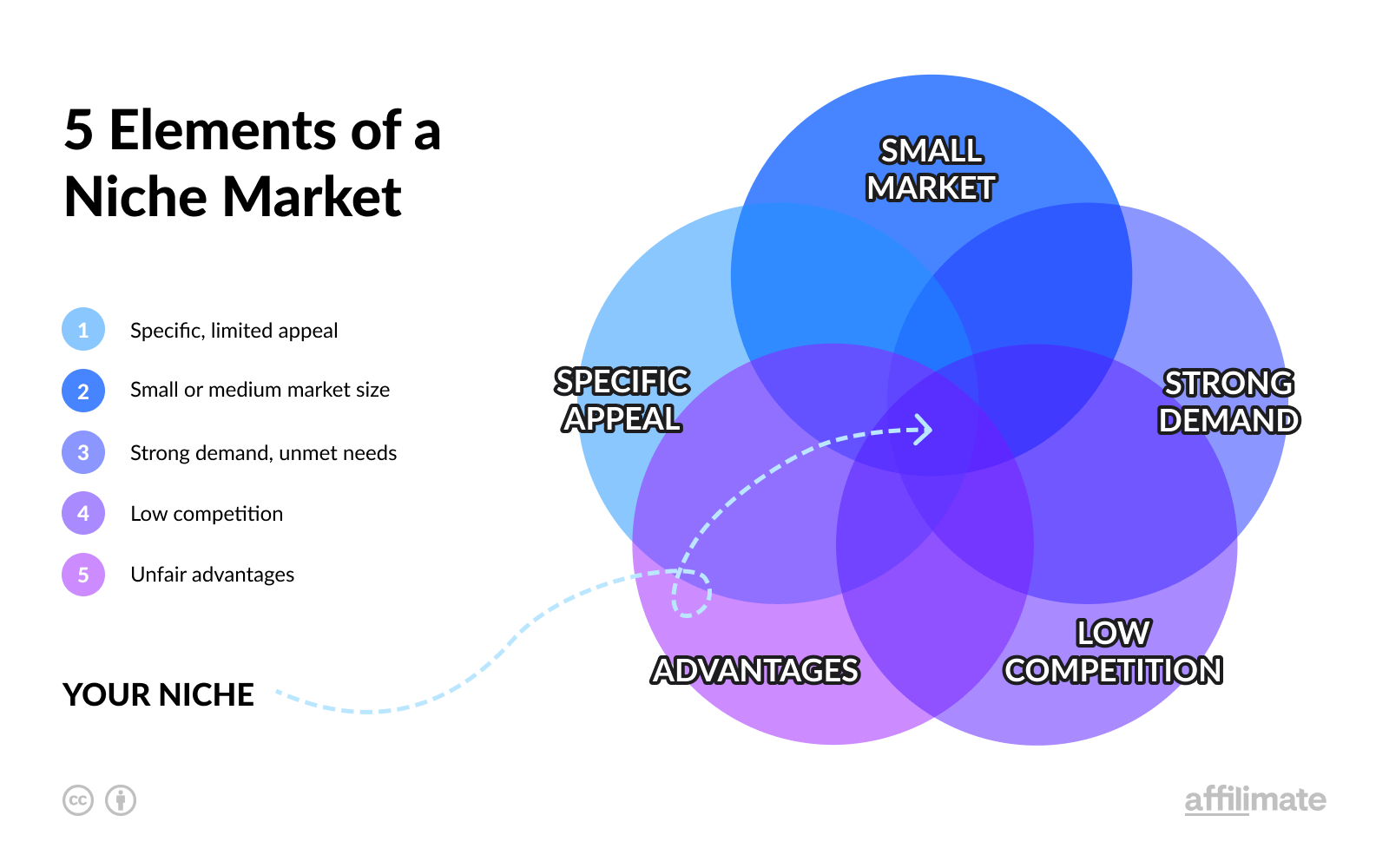
A niche market is a slice of a bigger market, which appeals to a more specific, limited audience whose needs are not met by the broad-market solution. Niche markets should be:
- Specific – The first advantage of going niche is how specifically you can tailor your product – people see it and think, "This is for people like me."
- Small – As a result of being specific, the total addressable market is comparatively small.
- In demand – The niche market has to want a tailored solution more than something general that's made for the broad market.
- Low in competition – By virtue of being small, niche markets are often – but not always – less competitive.
- Leaning on your advantages – If possible, you should bring your own experience, edge, and unfair advantages to the table.
Usually, niche markets are lower competition because it's not financially viable for large businesses to target them owing to the limited market size. They've got so many employees and operating expenses, having "just" a few thousand customers wouldn't pay the bills. This makes niche markets a great fit for smaller or independent businesses, who can expand into the broader market later on if it makes sense.
Targeting niches also helps you stand out in competitive industries because niche audiences have unique motivations, needs and desires that differ from that of the bigger market. Niching down helps you create an excellent offer to a target small group of people, rather than trying to be everything to everyone and failing to distinguish yourself.
Here's a niche market example
Imagine going to a restaurant and being handed a menu that has everything from Italian pasta to Indian curries to sushi. Would you trust this restaurant to serve all of these dishes exceptionally? Probably not.
What about that French restaurant downtown that only has five items on the menu? Now we’re talking. Maybe they don’t serve everything, but they’ve had the time to make those five dishes spectacular. The same goes for niche businesses: they've got a smaller selection, but what they do offer is perfect for their target customer.
Here's a concrete niche market example:
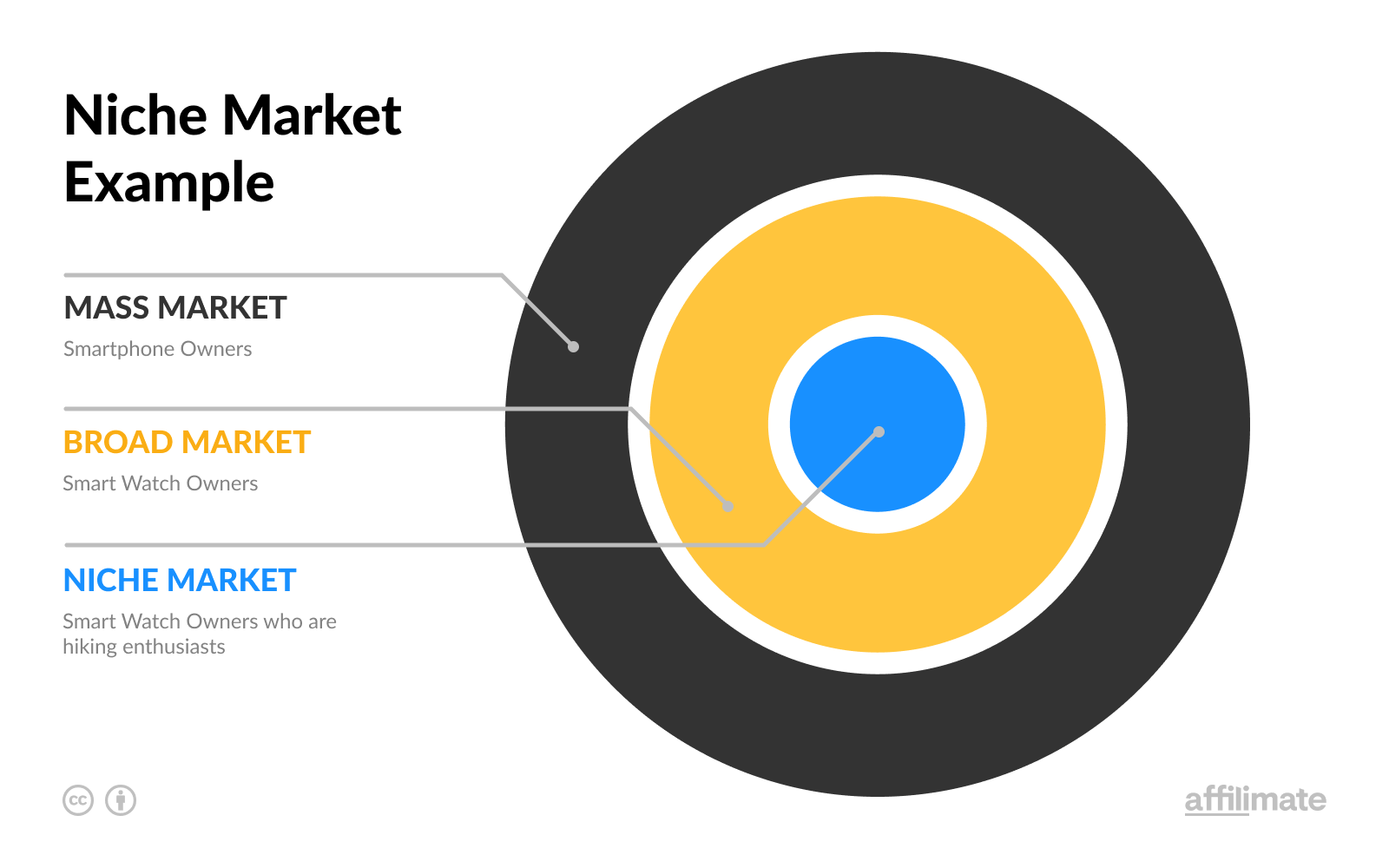
Being an expert in “technology” is hard because it's a broad industry with dozens – if not hundreds – of sub-categories. But focusing on a niche within the technology industry (a niche market example like, "smart watches" or even "smart watches for hiking enthusiasts") allows you to focus your time and effort into creating a product that serves the audience better than anyone else can.
And even though a niche like this might seem pretty narrow, brands thrive in this space such as Garmin which did $4.19 billion in revenue in 2020 and employs over 16,000 people. The term "hiking watches" has over 3,600 searches per month, and gives you the opportunity to broaden out into "fitness watches" or "running watches" down the line.
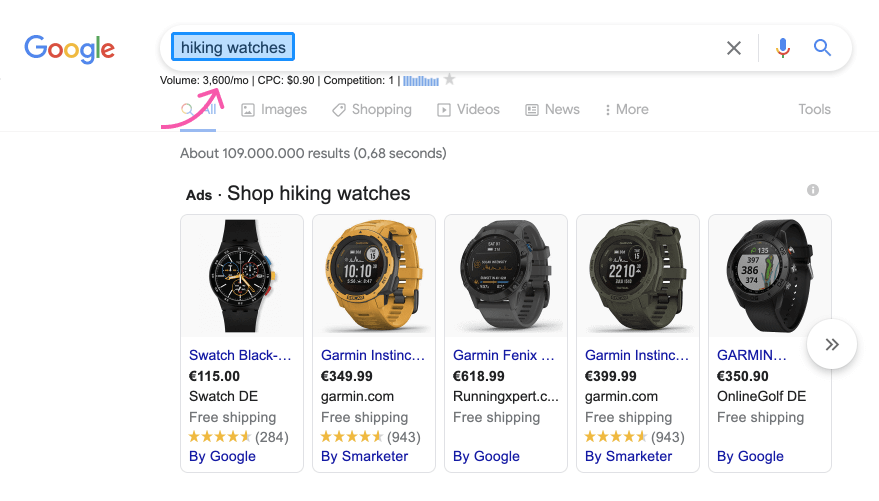
It goes to show, no niche is too narrow if you can serve it better than big players who are spread thin trying to appeal to a broad market.
What makes a niche "good"?
Not every niche is created equal. Some niches are evergreen, which means consumers are interested in this offer year-round and demand has been stable or growing for years.
Other niches are seasonal, meaning that they peak during certain times of the year (things like vacations or Christmas ornaments). Or the niche may be based on current trends, fads, or hype.
Niches where you're not sure yet whether it's going to stick, or you're actually in a bubble.
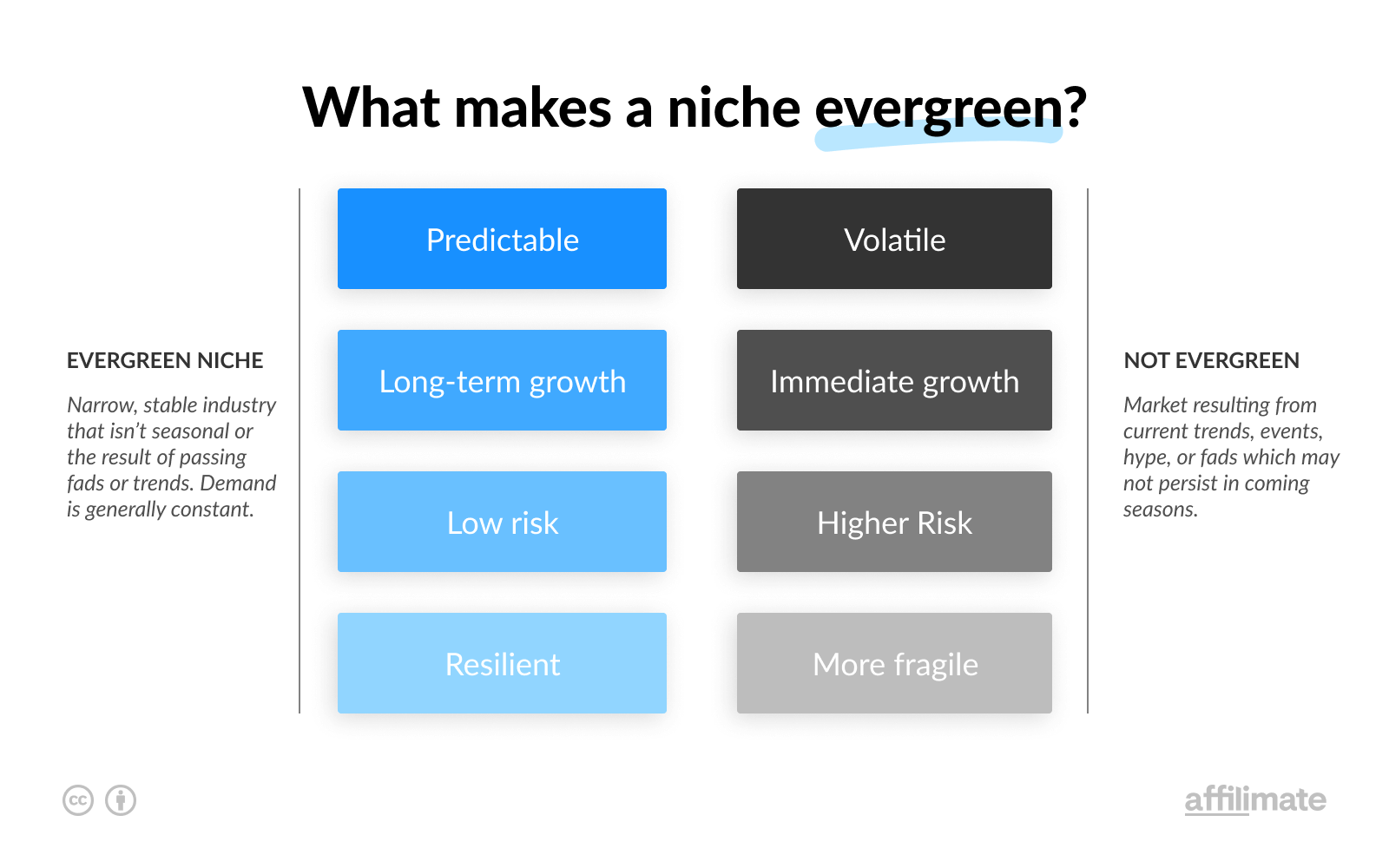
You also want to consider how profitable the niche is: What are your margins on the product? How high are your operating costs going to be? How long will it take until the money starts flowing? What kind of volume will you be able to do?
As an affiliate, this comes down to things like commission rates, average order value (AOV), and the conversion rates of the products and merchants you plan to promote.
How to do niche research
Almost anything can be a niche, but not every niche is lucrative. And even if it makes money, it’s not necessarily worth pursuing. Do your research thoroughly before investing in a niche, to make sure that your business will be sustainable long term.
Here's an overview of the niche research process:
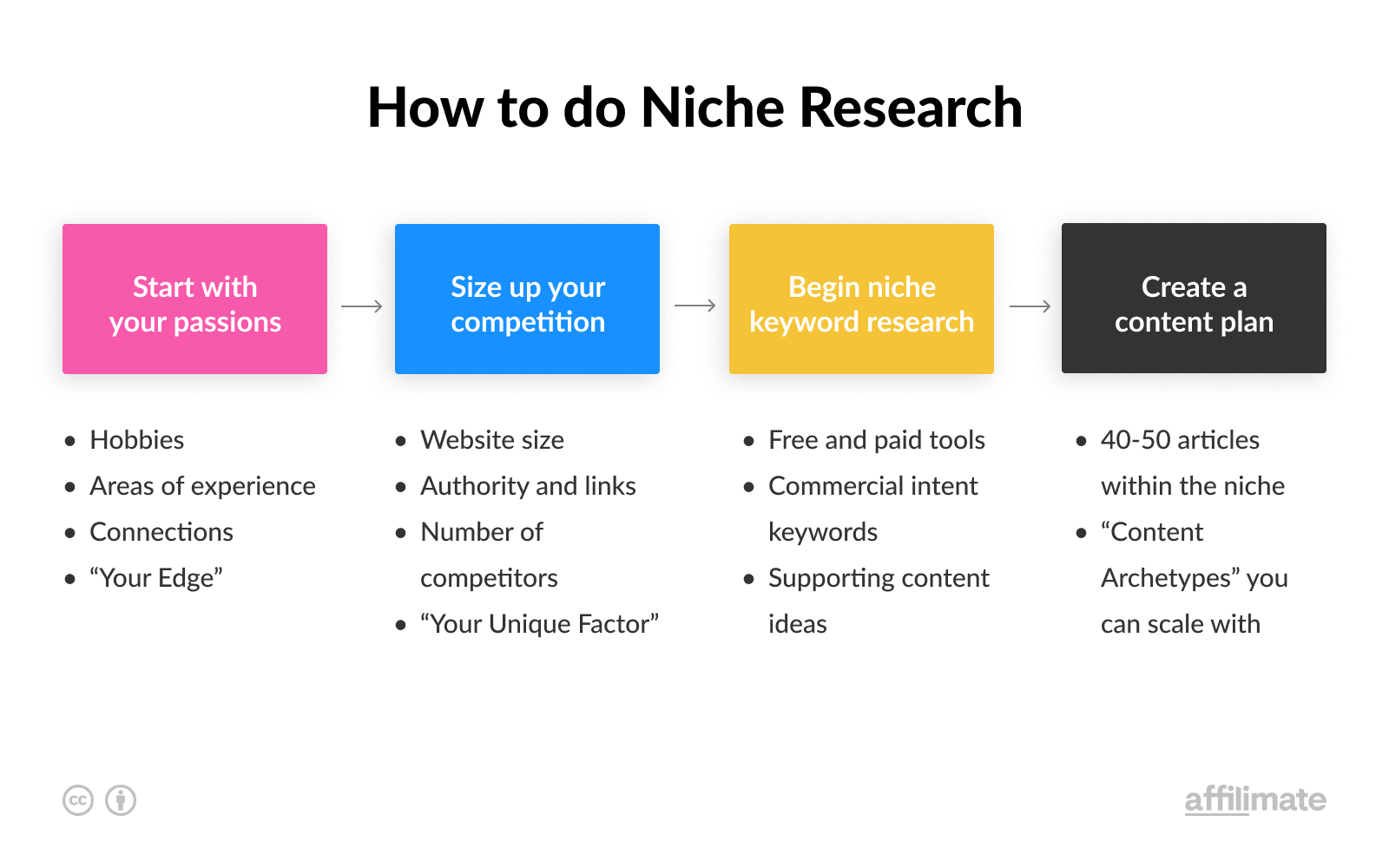
Each research step has a few critical points and success criteria, that can help you decide whether your niche "passes the test". A niche doesn't need a perfect score to be worth pursuing, but depending on your skills and budget, some will work better than others – especially if you're building your first business.
Here's how to do niche research in 5 steps:
- First, you need a niche idea
- Size up your competition
- Begin niche keyword research
- Create a content plan
- Evaluate the results (and act!)
Step 1. First, you need a niche idea
What are you especially interested in or excited about? By identifying your passions, you’ll find niche site ideas that won’t make you miserable down the line.
For example, fishing gear might be a profitable niche for affiliate marketing – but if you're a vegetarian, you might have a hard time relating to your audience...or spending hours researching and writing the "Pros and Cons" of 8 types of fishing bait.
That's why focusing on a niche you truly enjoy can give you an edge over competitors.
Producing excellent content, choosing interesting (and underserved) topics, and hiring good writers with a background on the subject is all easier when you know the niche. You'll be able to connect with your audience and relate to them in a way that purely researched niches rarely achieve.
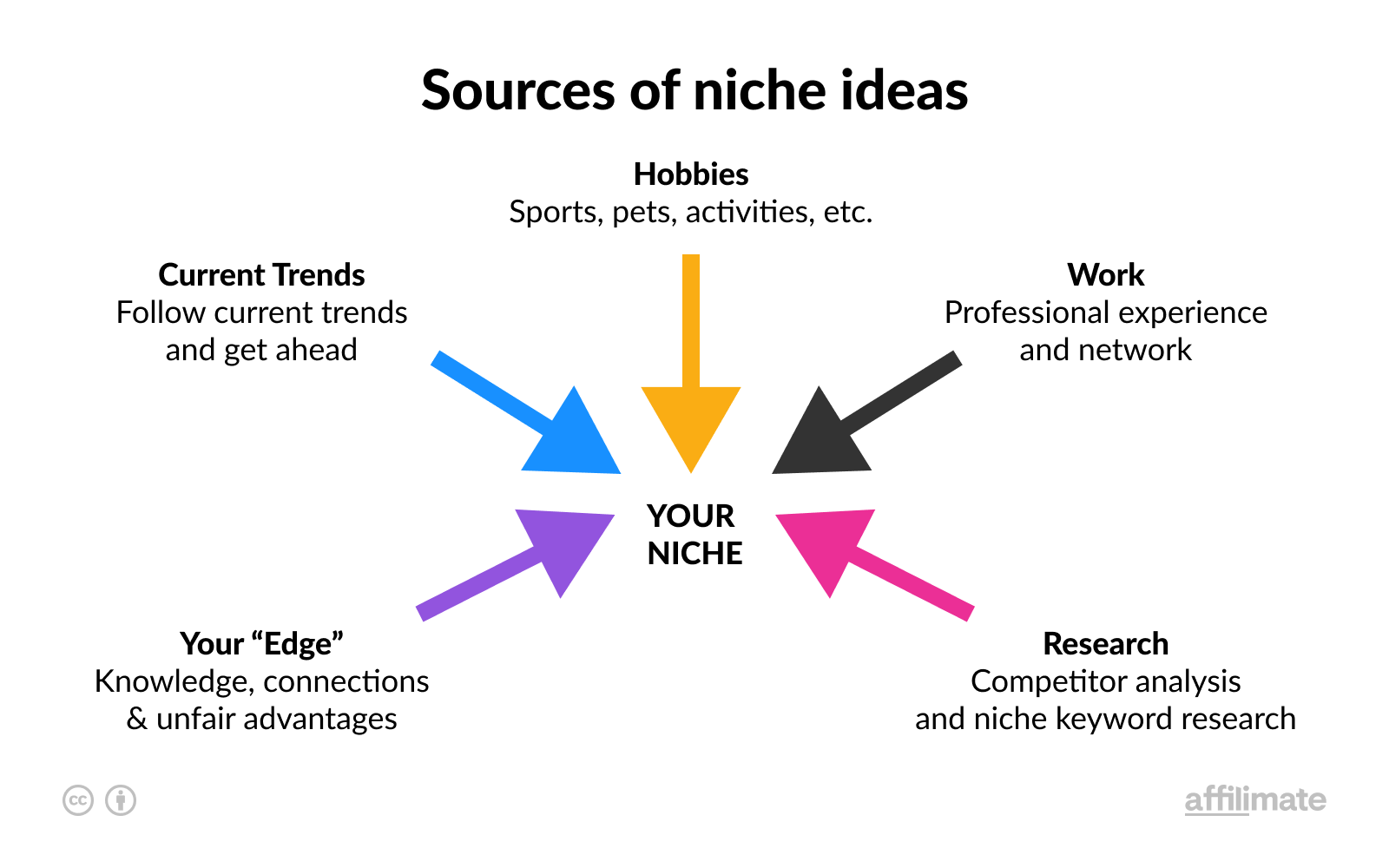
When thinking of niches to enter, think about:
- Your hobbies – What topics do you have an abnormal amount of knowledge about? How expensive are related products or training?
- Your professional network – Can you get an inside scoop on a niche thanks to your connections in the space?
- Your work experience – Do you have work experience in a niche that would let you get a headstart?
- Current trends – What trends or market changes do you see happening, which you can get in on early?
- Your edge – What special advantage do you have, which will make it hard to compete with you and help you build a moat around your business?
If you've got a partner, friend, or are going into the business with someone, you can work around their passions too. Plenty of entrepreneurs have gone into business to solve a problem for their spouse, and ended up being incredibly successful.
You don't have to be in the niche today as a consumer to become passionate or interested in it. But if you can't see yourself spending hours every week practicing or writing about the niche, it's best to move on.
Step 2. Size up your competition
No-competition niches may sound nice, but it usually indicates that the niche isn’t lucrative. When hardly anyone's covering the space, it might mean people have tried, failed, and have already moved on to something new.
Rather than looking for a niche that no one has heard about before, look for ways that you can stand out within a space that is already being monetized.
PRO TIP
Apart from a simple Google search for search terms you also want to target, one of the best ways to find competitors in your niche is to look at backlinks to affiliate network tracking domains.
This is especially easy if the tracking domain contains a unique subdomain. For example, Target's tracking domain with Impact is https://goto.target.com. Pop that into Ahrefs and filter by a keyword likely to be in the deep link:
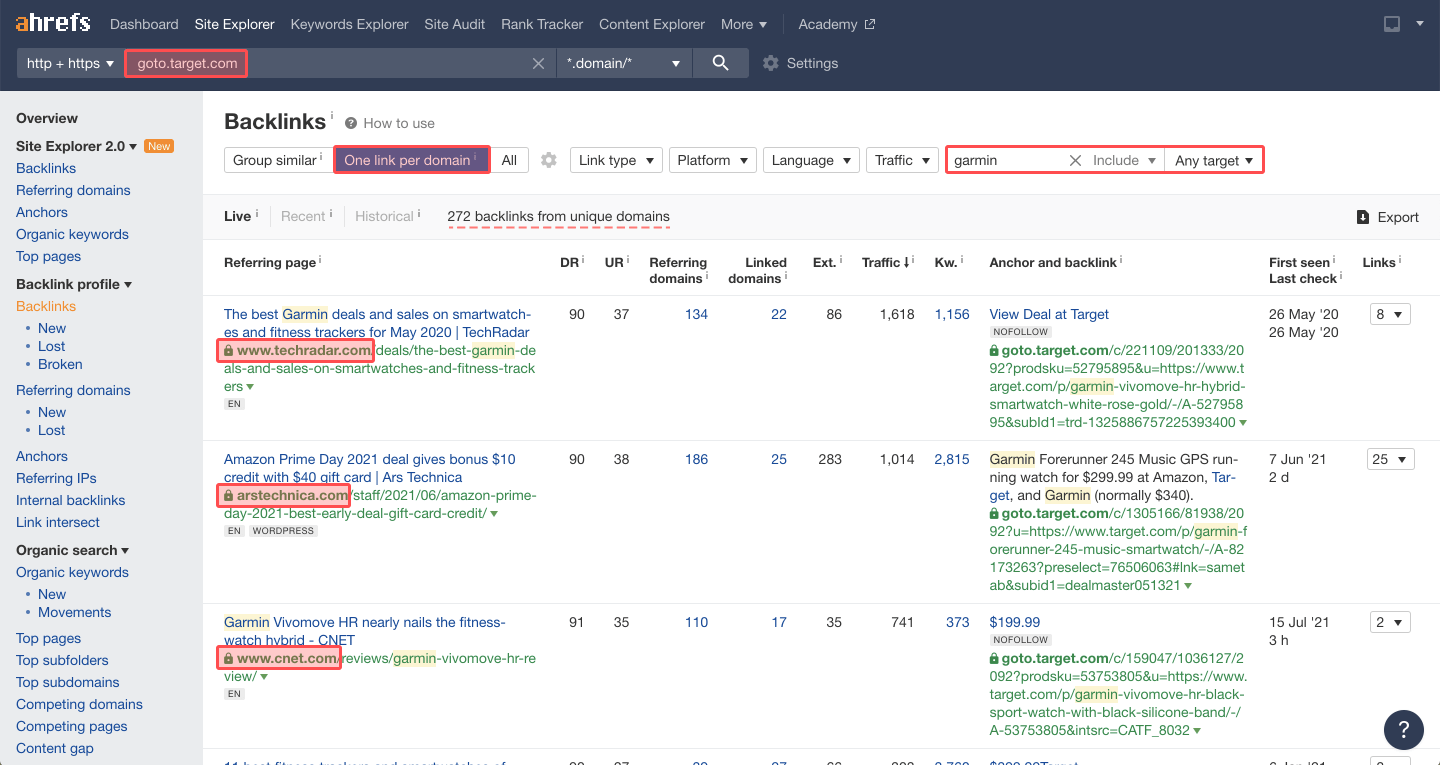
Naturally, any of these URLs can be searched with Ahrefs or your keyword research tool of choice to find its top keywords in Step 3.
Instead of starting with a specific merchant or product in mind, you can also take a competitor's website and filter their outbound links by popular affiliate tracking domains and SubID parameters. It all depends on how well you know the landscape before you start research.
Next, assess the challenge. How big are the affiliate sites in your niche? Are they huge house hold names with mountains of new coverage and backlinks? Or are they other enthusiasts like you, blogging for fun and hungry for a little competition?
Don't get discouraged if you immediately see large brands dominating these results.
There are still many niches where Google rewards more focused, niche websites, so you'll want to assess the mix on Page 1 and see if you could reasonable build a site that fits in. If even the "small guys" are spending hundreds per day on backlinks, you may struggle to keep up without a significant monthly budget to start.
Finally, round out your list of competitors. Get a good mix in your list of media companies, bloggers, niche sites, affiliate sites, and so forth.
An easy way to find more competitors is simply to use the "Competing Domains" report in Ahrefs or see who else is ranking for the same keywords, where they're linking to your target merchant or product.
Step 3. Begin using niche keyword research tools
This is where niche research tools such as keyword tools, trend analysis tools, and tools for navigating niche communities all come in handy. Here are some of our favorite niche research tools and techniques:
- Google Trends – Trending topics and searches by geography
- Subreddit Stats – Growing subreddits and topic ideas
- Localized Rankings – Local trends set to go (inter)national
- Google Search Console – Keywords in your own data no one is covering
- Answer the Public – Explore the question surface area of your target topic
- Answer Socrates – A free Answer the Public alternative with unlimited searches
- Exploding Topics – A Google Trends alternative with curated results
- Statista – Trends and statistics collected by a business intelligence company
- Similarweb – Traffic estimates for competitor websites in your niche
Just don't forget to spend time actually using Google itself to explore your niche the same way your target audience would. Watch the autocomplete, take note of smaller sites doing well in the SERPs, and see what you can learn from them.
Step 4. Create a content plan
Once you've got a list of competitors, one of the easiest things you can do is to take their keywords and filter them by difficulty. While any keyword tool's difficulty metric requires a human check to verify, it can be a rough way to sift through thousands of keywords for the ones you might want to target.
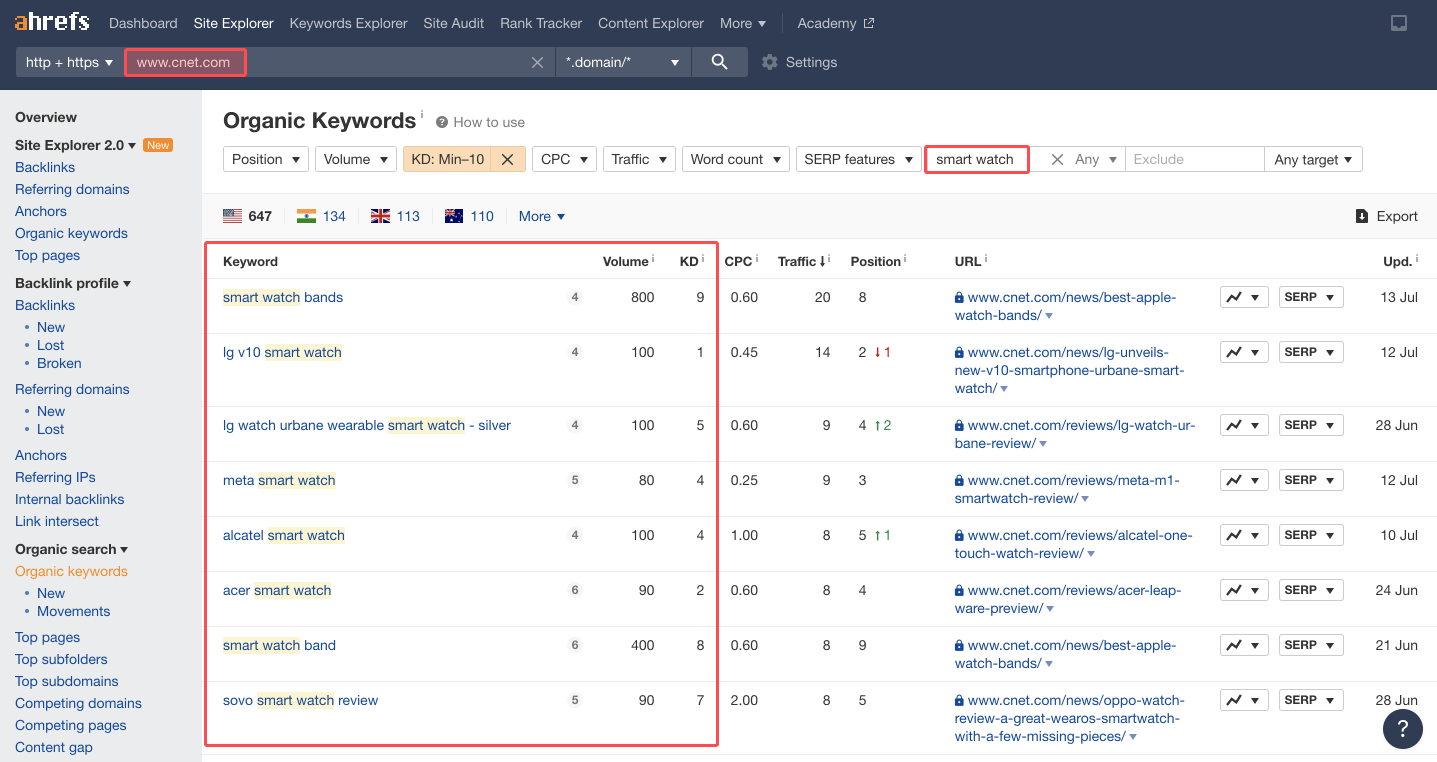
You want to make sure there is a good balance between informational content, as well as buyer intent keywords.
You can have the coolest and most profitable niche in the world, but if it doesn't drive people towards some kind of commercial action, business is going to be tough.
You should be able to produce 40-50 articles on a topic without exhausting the niche. Plan out the content you want to create within the niche to make sure there are enough subtopics and concepts to explore and build upon.
Step 5. Evaluate the results (and act!)
First, be sure to use multiple tools and approaches to validate your results. No one tool will give you 100% certainty, but if signs point to “yes” on multiple metrics, then you can be confident that you’ve picked a lucrative niche. Just remember to think long term. The best niches will have upward trends, as opposed to being fads that come and go.
Next, find your frenemies. Finding competition in a niche is a good sign it’s profitable. It also means that there are other people who you can learn from. Even if you’re technically competing with someone, follow their online presence to understand more about the niche and see what they are doing to monetize. Depending on what niche you’re going into, you might even make some “frenemies” (enemies who you’re friendly with) along the way.
Finally, diversify your affiliate partnerships. A great niche ensures your revenue isn’t made up by just any one program or revenue stream. Rules change, companies go bankrupt, shut down their affiliate program, or cut rates. No one can predict how or when an income stream will dry up. Don't be shy about exploring and trying affiliate networks besides Amazon to diversify your revenue.
Ready to get started?
Getting your affiliate website's tracking set up properly from the beginning can be a game-changer for monetizing efficiently.
Check out Affilimate's Free 15-Day Trial to bring all your affiliate networks into a single dashboard and attribute your conversions back to content on your website.

